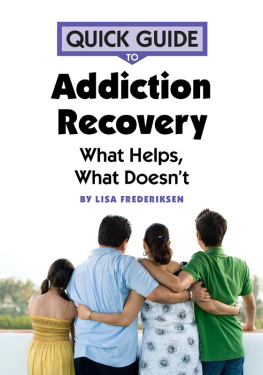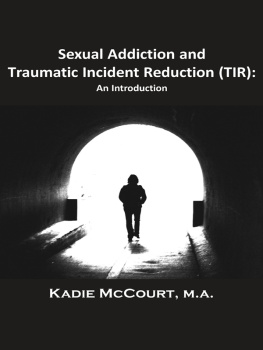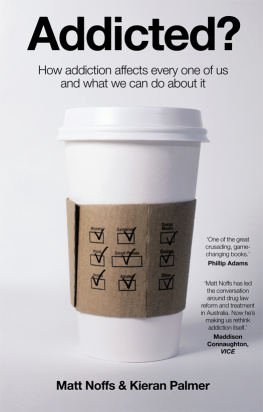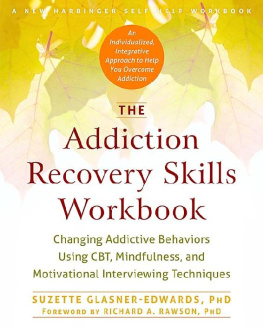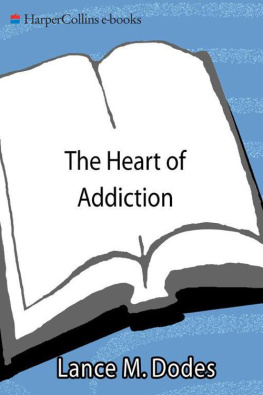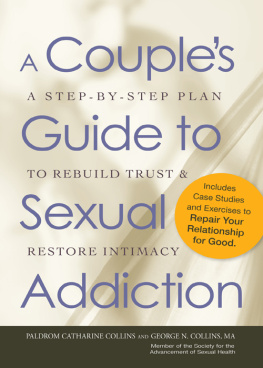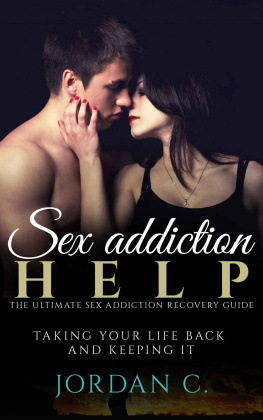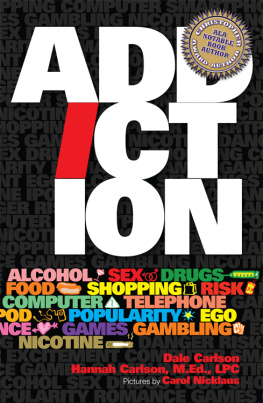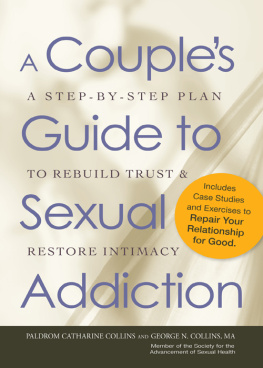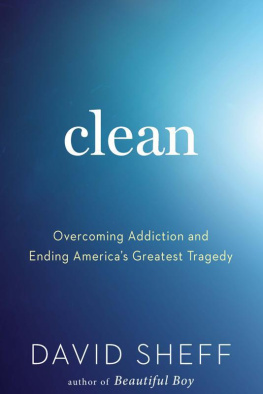About the Author
David Ley is a clinical psychologist in practice in Albuquerque, New Mexico, and currently serves as executive director of a large outpatient behavioral health agency. He earned his bachelors degree in philosophy from the University of Mississippi, and his masters and doctoral degrees in clinical psychology from the University of New Mexico. Dr. Ley has been treating sexuality issues throughout his career. He first began treating perpetrators and victims of sexual abuse, but expanded his approach to include the fostering and promotion of healthy sexuality, and awareness of the wide range of normative sexual behaviors.
Acknowledgments
I greatly acknowledge the support of my employer for supporting my clinical and professional development. A great many kind and supportive colleagues assisted me in understanding the controversy inherent in sex addiction, and identifying the ways in which this label is a problem for our society and the fields of mental health and sexuality. This work couldnt have happened without their assistance. Any errors or misstatements are solely my own.
In no particular order, my sincere gratitude and appreciation goes out to
Phil McGraw, PhD
Marty Klein, PhD
Jason Winters, PhD
Tory Clarke, PhD
Allen Frances, MD
Charles Moser, PhD, MD
David Ortmann, LCSW
Alfredo Aragon, PhD
Tony Dipasquale
Roy Baumeister, PhD
Curtis Bergstrand, PhD
Sari Van Anders, PhD
Angela Kilman
Self Serve Sexuality Resource Center
Steven Ratcliff
Steven Braveman, MA, LMFT
Brenda Wolfe, PhD
Richard Sprott, PhD
Matt Tandy, LPCC
Danielle Cossett, LISW
Janet Hardy
Christopher Ryan, PhD
William Henkin, PhD
Jeff Rudski, PhD
Rory Reid, PhD
Charles Samenow, MD
Selected Bibliography
Akbar, Arifa. Einsteins Theory of Infidelity. Independent, July 11, 2006.
Albright, J. Sex in America Online: An Exploration of Sex, Marital Status, and Sexual Identity in Internet Sex Seeking and Its Impacts. Journal of Sex Research 45, no. 2 (2008): 175186.
American Psychiatric Association. Diagnostic and Statistical Manual: Mental Disorders. Washington, DC: American Psychiatric Association, 1952. http://www.psychiatryonline.com/DSMPDF/dsm-i.pdf .
. Diagnostic and Statistical Manual: Mental Disorders. Washington, DC: American Psychiatric Association, 1952. http://www.psychiatryonline.com/DSMPDF/dsm-i.pdf .
. Diagnostic and Statistical Manual: Mental Disorders. 2nd ed. Washington, DC: American Psychiatric Association, 1968. http://www.psychiatryonline.com/DSMPDF/dsm-ii.pdf .
. Diagnostic and Statistical Manual: Mental Disorders. 3rd ed. Washington, DC: American Psychiatric Association, 1980.
. Diagnostic and Statistical Manual: Mental Disorders. 3rd ed. revised. Washington, DC: American Psychiatric Association, 1987.
. Diagnostic and Statistical Manual of Mental Disorders. DSM-IV-TR. 4th ed. Washington, DC: American Psychiatric Association, 2000.
. Diagnostic and Statistical Manual: Mental Disorders. 4th ed. revised. Washington, DC: American Psychiatric Association, 2000.
. Resolution on Appropriate Affirmative Responses to Sexual Orientation Distress and Change Efforts. 2011. http://www.apa.org/about/governance/council/policy//sexualorientation.aspx .
Anonymous. Why Men Cheat. Esquire, April 2010.
Aragon, A. Detection of Malingering in Chronic Frotteurists. 1999. Copy obtained from author.
Ariely, D. Predictably Irrational: The Hidden Forces that Shape Our Decisions. New York: HarperCollins, 2010.
Arnott, S. Sex: A Users Guide. New York: Random House Digital, 2010.
Bamuhigire, O. Sex Addiction: A Growing Problem. New Vision, 2006. http://www.aegis.org/news/nv/2006/NV060108.html .
Bancroft, J., C. A. Graham, E. Janssen, and S. A. Sanders. The Dual Control Model: Current Status and Future Directions. Journal of Sex Research 46, nos. 23 (2009): 121142.
Bancroft, J., and Z. Vukadinovic. Sexual Addiction, Sexual Compulsivity, Sexual Impulsivity or What? Toward a Theoretical Model. Journal of Sex Research 41 (2004): 225234.
Baumeister, R. Escaping the Self: Alcoholism, Spirituality, Masochism, and Other Flights from the Burden of Selfhood. New York: Basic Books, 1991.
. Evil: Inside Human Violence and Cruelty. New York: Freeman, 1997.
. Is There Anything Good About Men? How Cultures Flourish by Exploiting Men. New York: Oxford University Press, 2010.
Baumeister, R., K. Catanese, and K. Vohs. Is There a Gender Difference in Strength of Sex Drive? Theoretical Views, Conceptual Distinctions, and a Review of Relevant Evidence. Personality and Social Psychology Review 5, no. 3 (2001): 242273.
Bayer, R. Homosexuality and American Psychiatry: The Politics of Diagnosis. Princeton, NJ: Princeton University Press, 1987.
Bechtel, S. The Practical Encyclopedia of Sex and Health. Emmaus, PA: Rodale, 1993.
Bergstrand, C., and J. Sinski. Swinging in America: Love, Sex, and Marriage in the 21st Century. Santa Barbara, CA: Praeger, 2010.
Bivona, J., and J. Critelli. The Nature of Womens Rape Fantasies: An Analysis of Prevalence, Frequency, and Contents. Journal of Sex Research 46 (2009): 33.
Blumberg, E. Lives and Voices of Highly Sexual Women. Journal of Sex Research 40, no. 2 (2003): 151.
Bright, Susie. http://susiebright.blogs.com/susie_brights_journal_/pregnancy .
Briken, P., N. Habermann, W. Berner, and A. Hill. Diagnosis and Treatment of Sexual Addiction: A Survey among German Sex Therapists. Sexual Addiction & Compulsivity 14, no. 2 (2007): 131143.
British Psychological Society. Response to the American Psychiatric Association: DSM-5 Development. 2011. http://apps.bps.org.uk/_publicationfiles/consultation-responses/DSM-5%202011%20-%20BPS%20response.pdf .
Browning, J., D. Kessler, E. Hatfield, and P. Choo. Power, Gender, and Sexual Behavior. Journal of Sexual Research 36, no. 4 (1999): 342347.
Burch, R., and G. Gallup. The Psychobiology of Human Semen. In Female Infidelity and Paternal Uncertainty, ed. S. M. Platek and T. K. Shackelford, 141172. New York: Cambridge University Press, 2006.
Burns, M. Cases of Persecuted Sexual Activity. http://www.solresearch.org/~SOLR/rprt/bkgrd/JSOcases.asp .
Burroughs, W. Junky. New York: Penguin, 1977.
Buzwell, S., and D. Rosenthal. Constructing a Sexual Self: Adolescents Sexual Self-Perceptions and Sexual Risk-Taking. Journal of Research on Adolescence 6 (1996): 489513.
Callaway, E. Porn in the USA: Conservatives Are Biggest Consumers. New Scientist, February 27, 2009. http://www.newscientist.com/article/dn16680-porn-in-the-usa-conservatives-are-biggestconsumers .
Carey, B. Female Take-Over in Counseling. New York Times, May 29, 2011. http://www.ocala.com/article/20110529/WIRE/110529819?p=all&tc=pgall .
Carnes, P. The Case for Sexual Anorexia: An Interim Report on 144 Patients with Sexual Disorders. www.sexhelpworkshops.com/Documents/ARTICLE_Case%20for%20Sexual%20Anorexa%20144%20patients_PCarnes.pdf .
. Dont Call It Love: Recovery from Sexual Addiction. New York: Bantam, 1992.
. Out of the Shadows: Understanding Sexual Addiction. 2nd ed. Minneapolis, MN: Hazelden, 1992.
Carnes, P., and J. Schneider. Recognition and Management of Addictive Sexual Disorders: Guide for the Primary Care Clinician. Primary Care Practice 4, no. 3 (2000): 302318.
Carroll, J., K. Volk, and J. Hyde. Differences between Males and Females in Motives for Engaging in Sexual Intercourse.


